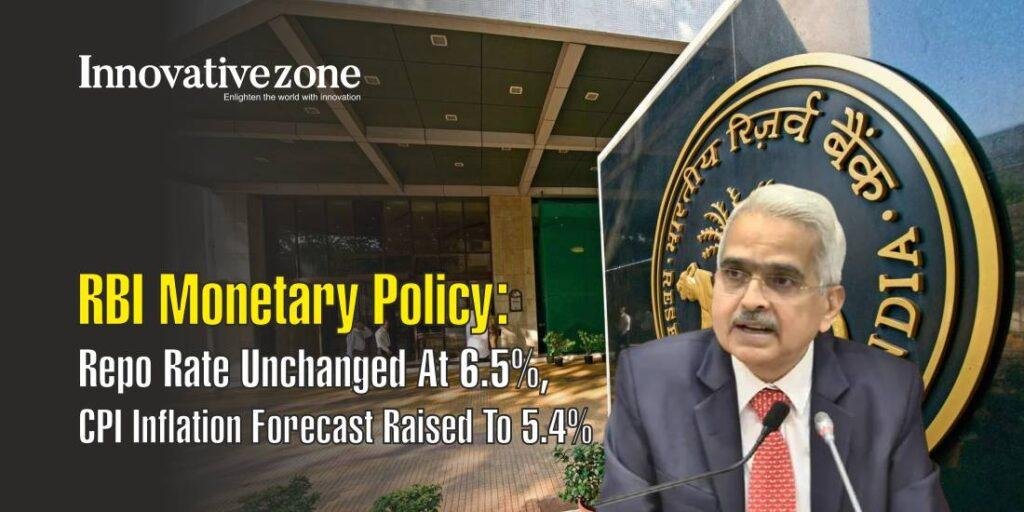RBI Monetary Policy: Repo Rate Unchanged At 6.5%, CPI Inflation Forecast Raised To 5.4%
Written by Sanjay Kumar
Reserve Bank of India
Central bank
- Governor: Shaktikanta Das
- Founded: 1 April 1935, Kolkata
- Founder: British Raj
- Currency: Indian rupee (₹); INR (ISO 4217)
- Headquarters: Mumbai, Maharashtra, India
- Ownership: Ministry of Finance, Government of India
For the third time in a row, the Reserve Bank of India’s (RBI) Monetary Policy Committee (MPC) has decided to maintain the repo rate at 6.50 percent (unchanged). Furthermore, they have reiterated their commitment to focusing on the withdrawal of accommodation, in line with their unchanged stance.
The 6-member MPC panel voted unanimously to keep rates unchanged, with 5 out of 6 members voting in favor of maintaining the current stance.
While the national economy persists in expanding at a respectable pace and contributes 15% to global growth, Governor Shaktikanta Das declared that the MPC would vigilantly observe the economic landscape.
Acknowledging the recent upswing in vegetable prices, particularly the cost of tomatoes, alongside a general strengthening of global prices, the RBI has revised its inflation projection for the consumer price index-based inflation in the period 2023-24 (April-March) from 5.1% to 5.4%.
Governor Das mentioned that the CPI for July is projected to surpass the upper limit of the 2-6% tolerance range, reaching 6.2%.
“Anticipate a notable surge in headline inflation in the near future… Uncertainties persist regarding domestic food price trends,” emphasized the Governor.
While the expected policy stance was upheld, the RBI’s decision to impose a 10% incremental Cash Reserve Ratio (CRR) on banks dampened the sentiments on Dalal Street.
As a result, the BSE Sensex descended by 450 points, or 0.6%, settling at 65,586, while the NSE Nifty experienced a loss of 115 points, equivalent to 0.59%, reaching a trade value of 19,517.
The incremental CRR requirement was enforced for the duration spanning May 19 to July 28. Governor Das disclosed that a review of this measure would be conducted on September 8, clarifying that this maneuver is of a “strictly” temporary nature.
“Efficient liquidity management requires continuous assessment of the level of surplus liquidity so that additional measures are taken as and when necessary to impound the element of excess liquidity,” Das said.
This action by the central bank provoked apprehensions concerning market liquidity conditions, culminating in widespread selling across the banking sector.
Within this context, shares of Bank of Baroda, Kotak Mahindra Bank, ICICI Bank, and AU Small Finance Bank experienced declines ranging from 0.5% to 1.4%.
Must Read:-
- Top 10 Largest Oceans and Seas in the World
- Top 10 automobile companies in India 2023
- Top 10 Electrical Companies in India 2023
- Top 10 Real Estate Companies in India-2023
- Top 10 most awaited & upcoming Hindi web series 2023-24
- Top 10 Clothing Brands in India 2023
- Top 10 best cultures in the world-2023
- Top 10 best country to work and live in 2023
- Top 10 best country for education 2023
- Top 10 Most Followed Celebrities on Instagram 2023
- The Inspiring Success Story of Bear Grylls
- Top 10 Business Coaches in The World to Guide Entrepreneurs In 2023
- Top 10 movies based on True Stories you must watch before you die
- Top 10 Best Online Doctor Consultation Apps in USA


